Jackson lets her running do her talking
Jamaican sprinter wins women's 200 meters in World Champs with second-fastest time in history
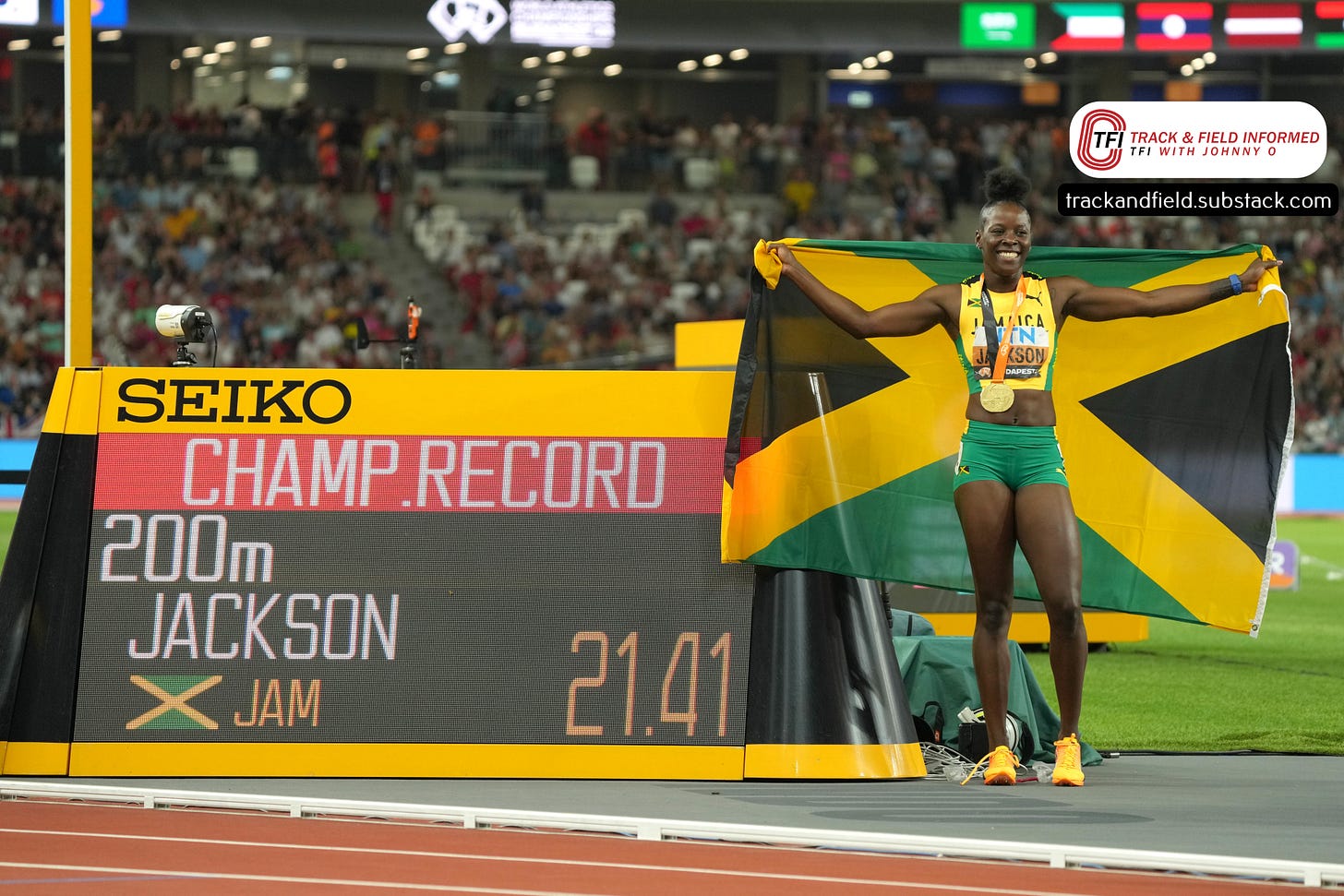
Call her the low-key champion.
She is not a big talker.
Nor is she super out-going or flamboyant.
But when the seventh day of the World Athletics Championships came to a close in Budapest, Hungary on Friday night, no athlete had turned in a better single performance on the track than Shericka Jackson of Jamaica.
Running out of lane 6 in the final of the women’s 200 meters on Friday, the 29-year-old Jackson destroyed the field in clocking a winning time of 21.41 seconds.
Noah Lyles of the U.S., who is very much known for his gregarious and flamboyant nature, won the men’s 200 in the final race of the night to complete his victorious 100-200 double in Budapest. But while his winning time of 19.52 was tied for 14th on the all-time world performance list, Jackson’s clocking was the second fastest ever run behind American Florence Griffith-Joyner’s 21.34 best set during the 1988 Olympic Games in Seoul, Korea.
Yulimar Rojas of Venezuela and Haruka Kitaguchi of Japan posted dramatic victories in the women’s triple jump and javelin by winning those respective events on their final attempts of the competition. But neither them nor Lyles could match the brilliance or dominance of Jackson, who had finished second to Sha’Carri Richardson of the U.S. in the 100 on Monday.
Richardson set a personal best of 21.92 while finishing third in the 200 on Friday, and U.S. teammate Gabby Thomas placed second in 21.81. But it was clear after the first 100 meters of the race that no one was going to be able to challenge Jackson, who set her previous national record of 21.45 in winning the World title in Eugene, Oregon last year.
Jackson was so overwhelming that Ato Boldon said on the NBC Sports broadcast that the race for first place had essentially ended after Jackson had taken her first 10 steps of the race and launched into her drive phase.
Yet despite her performance, which gave her the largest margin of victory in the women’s 200 meters in the World Championships since 2007 when Allyson Felix of the U.S. defeated second-place Veronica Campbell of Jamaica, 21.81 to 22.34, Jackson seemed disappointed with her time.
She had said previously that her training indicated she was faster and stronger than last year. And the expression on her face afterward looked like that of someone who expected to have run faster than she did.
The next three finishers behind the medalists were Julien Alfred of St. Lucia in 22.05, Daryll Neita of Great Britain in 22.16, and Anthonique Strachan of the Bahamas in 22.29.
Jackson’s victory continues her rather unique story as a sprinter, as she she had been a quarter-miler for much her career, placing third in the 2015 World Championships in Beijing and in the 2019 meet in Doha, Qatar, as well as winning a bronze medal in the 2016 Olympic Games in Rio de Janeiro when she finished behind Shaunae Miller of the Bahamas and Felix.
There were people who questioned her thinking when she decided to focus on the short sprints in 2021. But after finishing third in the 100 in that year’s Olympic Games in Tokyo, she had now placed second in the 100 and first in the 200 in consecutive World Championships.
Following her performance Thursday, she did seem proud of what she had accomplished.
“As an athlete you have to bounce back from what you would probably call a disappointment," Jackson told the BBC when talking about her runner-up finish to Richardson in the 100. “One of my main goals this season was to win both 100 and 200. It didn't happen. I said, It’s not supposed to happen.”
She then added that she “did pretty good tonight. Ah, 21.41, I'm getting there, I'm getting to where I want to be and tonight was a living testimony of never give up.
"I'm pretty proud, especially for my community. I know my Mum was going on [excited].”
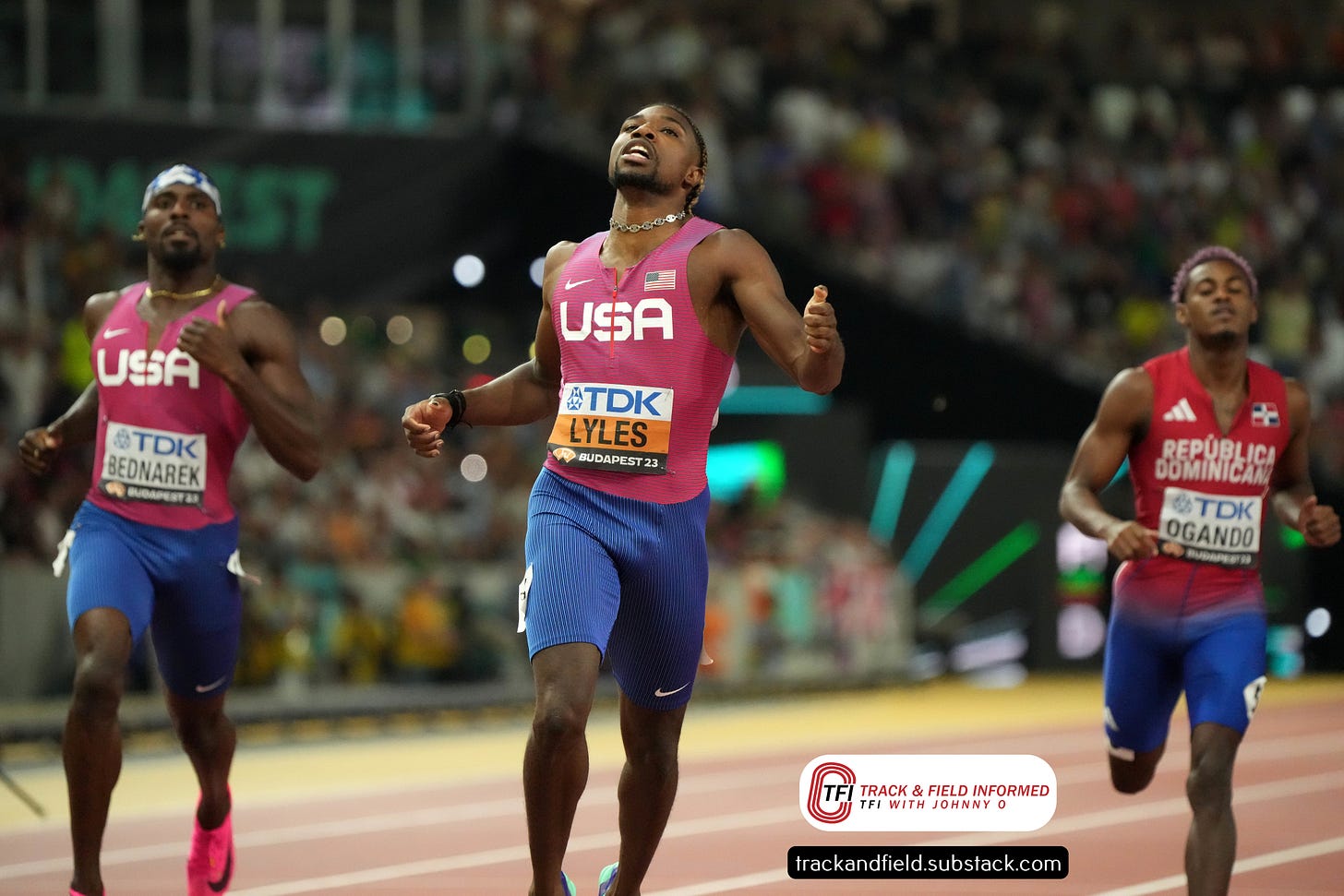
Excitement is something that Lyles thrives on and he produced plenty of it with his performance in the 200 on Friday. The victory gave him his third consecutive title in the event and made him the first man since Usain Bolt of Jamaica in 2015 to win the 100 and 200 in the World Championships in the same year. He also became the first American to accomplish that feat since Tyson Gay in 2007.
Although the 26-year Lyles’ winning time of 19.52 was well short of the 19.19 world record that Bolt set in the 2019 World Championships in Berlin, as well as the 19.31 which he ran in last year’s meet, he defeated second-place Erriyon Knighton by a solid two meters as his American teammate finished in 19.75.
Letsile Tebogo of Botswana, runner-up to Lyles in the 100 last Sunday, placed third in 19.81, followed by 100-meter bronze medalist Zharnel Hughes of Great Britan in 20.02, last year’s silver medalist Kenny Bednarek of the U.S. in 20.08, and Olympic champion Andre De Grasse of Canada in 20.14.
“Of course, I wanted to be faster, or at least wanted to break the American record again,” Lyles was quoted as saying in a Reuters post.
But he added that he couldn’t “be sad” about running 19.52 in his sixth race — when you count heats and semifinals — of these championships.
“I remember when I won my first World Championships, and I ran 19.8, I couldn’t watch that race for months because I felt so disappointed in myself.
“But after years I looked back on that race and [thought], I actually did that. I did it young, it was a great field and it was a hard World Championships. It was the one that started this off. Now I look back on World Championships not for the times, but for what I had to go through to get the win.”
Rojas, who won an unprecedented fourth consecutive title in the women’s triple jump on Friday to go with three indoor titles, and Kitaguchi, who became the first Japanese woman to win the javelin in the World Championships, produced clutch performances on their final attempts.
The 27-year-old Rojas was arguably the biggest pre-meet favorite in these championships as she had won 28 consecutive meets indoors and outdoors since finishing second in the Weltklasse meet in Zurich in 2019. In 24 of those meets, she had leaped more than 15 meters (49 feet 2½ inches). During that same period, three other women had combined to top 15 meters in a total of three meets.
But after the first three rounds of the competition on Friday, Rojas was in eighth place with a best of 14.33 (47-0¼). She then fouled her fourth and fifth attempts.
Her sixth jump was far from the best of her career, but at 15.08 (49-6¾) it put her into the lead, eight centimeters ahead of Maryna Bekh-Romanchuk of Ukraine, who had jumped 15.00 in the first round.
Four other women had jumped 14.87 (48-9½) or further so Rojas had to watch each of them fall short of her mark on their final attempts of the competition before she could celebrate her victory.
Following Bekh-Romanchuk at 15.00 were Leyanis Perez Hernandez of Cuba at 14.96 (49-1), last year’s silver medalist Shanieka Ricketts of Jamaica at 14.93 (48-11¾), Thea Lafond of Dominica at a national record of 14.90 (48-10¾), and Liadagmis Povea of Cuba at 14.87 (48-9½).
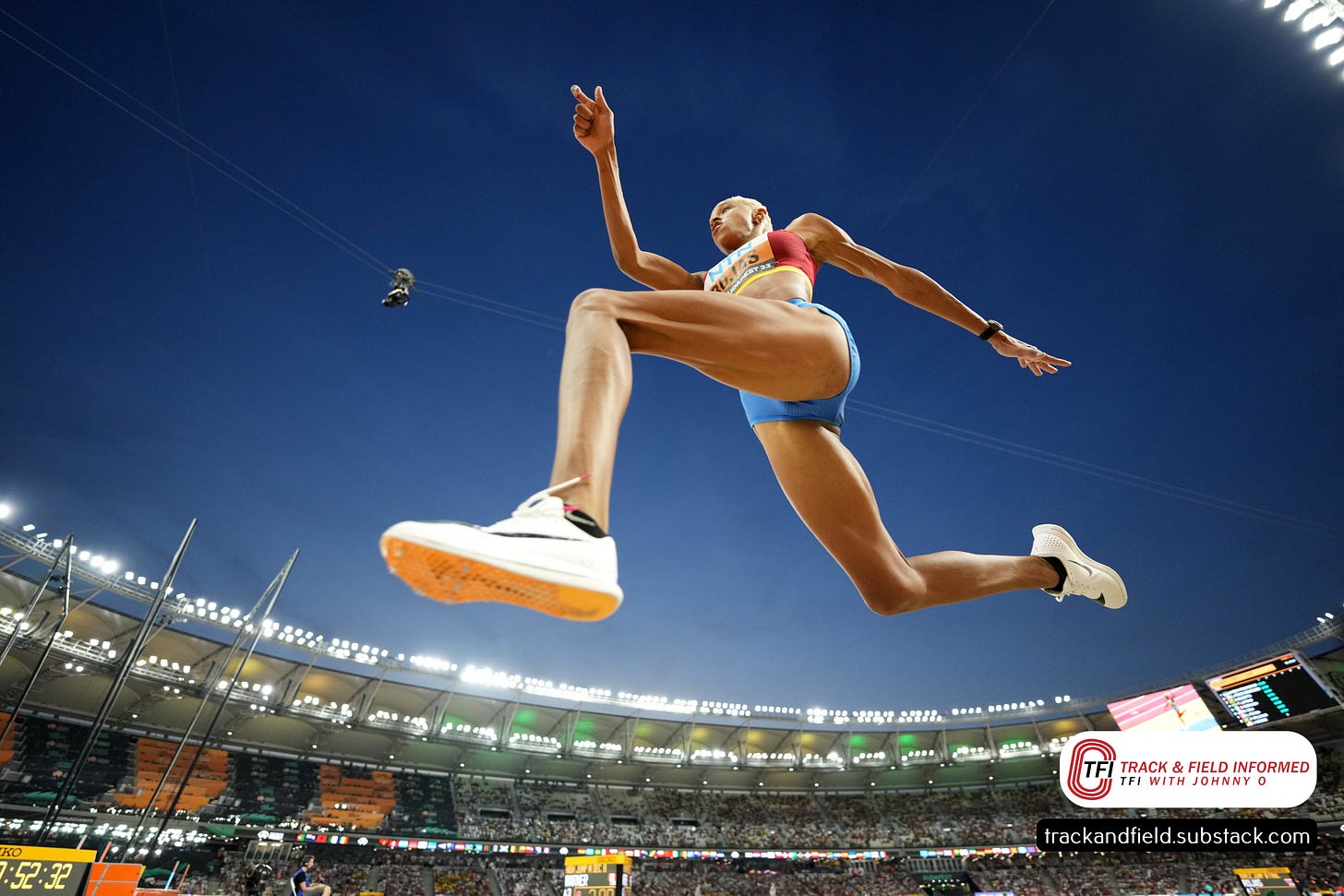
“It was very difficult,” Rojas said in a World Athletics post. “The fact that I won the competition with my last attempt makes it very special and memorable. This is my seventh world championship gold in a row, but this is the most special of all of them. My last attempt was proof of the hard work I have done, my mental state and my self-confidence. I didn't care about the distance, the only thing I had in mind was to win the gold.”
The 25-year-old Kitaguchi had entered the final of the women’s javelin with the farthest throw in the world this year at 67.04 (219-11).
She was in second place after the first three rounds with a best of 63.00 (206-8), but had slipped to third after round five. She then dropped another spot when Mackenzie Little of Australia improved to 63.38 (207-11) on her final throw to move into second place in the standings behind the South American record of 65.47 (214-9) that Flor Denis Ruiz Hurtado of Colombia had thrown in the first round.
Down to her final attempt, Kitaguchi unleashed a high, arching throw that measured 66.73 (218-11) and helped her improve two spots on her third-place finish from last year.
Anete Cocina of Latvia finished fourth at 63.18 (207-3), followed by Victoria Hudson of Austria at 62.92 (206-5) and Shiying Liu of China at 61.66 (202-3).
Kelsey-Lee Barber of Australia, the two-time defending champion, placed seventh at 61.19 (200-9).
Kitaguchi said in a post on sports.yahoo.com that she thought her victory would help to increase the popularity of the event in Japan.
She added that her coach, Czech David Sekerak, was "more or less screaming at me" as he tried to motivate her from the stands in Budapest.
“But I think everything just came together in the last attempt and it was great," she said of her winning throw. “At the beginning, I thought that I would be crying, but now, I just feel the happiness."
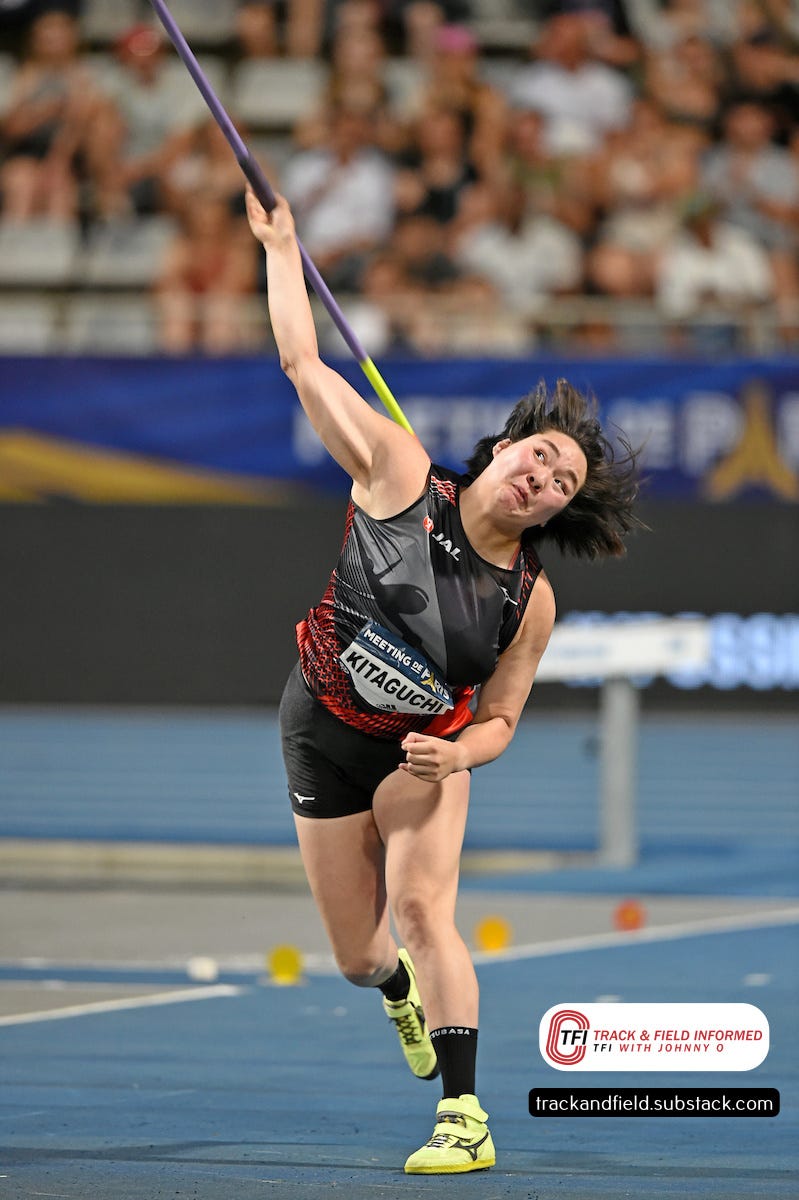
The decathlon began on Friday and Leo Neugebauer of Germany led after the first five events with 4,640 points. He was followed by Canadians Pierce LePage with 4,610 points and Damian Warner with 4,578.
Lindon Victor of Grenada was in fourth place with 4,476 points, followed by Johannes Erm of Estonia with 4,430, and Ayden Owens-Delerme of Puerto Rico with 4,429.
The 23-year-old Neugebauer had set a collegiate and German record of 8,836 points in winning the NCAA title for the University of Texas in early June.
The mark was the highest in the world this year and moved him to eighth on the all-time world performer list. But due to Neugebauer’s youth and relative inexperience at the international level, Olympic champion Warner and world-record-holder and defending World champion Kevin Mayer of France were regarded by many as the men to beat.
However, Mayer withdrew from the competition after the long jump with an injured Achilles tendon.
Neugebauer, 10th in last year’ meet, got off to a solid start when he ran 10.69 seconds in the 100 meters. He then hit huge personal bests of 8.00 (26-3) in the long jump and 17.04 (55-11) in the shot put to take a 96-point lead over second-place Warner after three events.
He cleared 2.02 (6-7½) in the high jump and ran 47.99 in the 400 to end the first day of competition with a score that is 49 points higher than what he totaled in the NCAA Championships.
In addition to Mayer, Zach Ziemek of the U.S., Ash Moloney of Australia, and Niklas Kaul of Germany withdrew from the competition due to injuries.
Ziemek was the bronze medalist in the World Championships last year, Moloney was the bronze medalist in the Olympics, and Kaul won the 2019 World title.
Other events contested on Friday were the semifinals of the women’s 800 meters, heats in the men’s and women’s 400 relay, and qualifying in the men’s javelin and women’s high jump.
In the women’s 800, the three semifinal heats were won by Great Britain’s Keely Hodgkinson (1:58.48) and Jemma Reekie (2:00.28), and Kenya’s Mary Moraa (1:58.48).
Defending Olympic and World champion Athing Mu of the U.S. grabbed the second automatic qualifying spot in the third semifinal with a time of 1:58.78 after getting turned sideways at the start of the backstretch when she had to side step Prudence Sekgodiso of South Africa after she had fallen to the track after getting tangled up with another runner.
Mu was briefly in seventh place after the mishap, but she stayed calm and was back in the thick of things by the end of the backstretch, and appeared to be running well within herself down the home straightaway.
Natoya Goule-Toppin of Jamaica was a notable non-qualifier as the fifth-place finisher in last year’s meet placed third in 2:00.78 in the second semifinal.
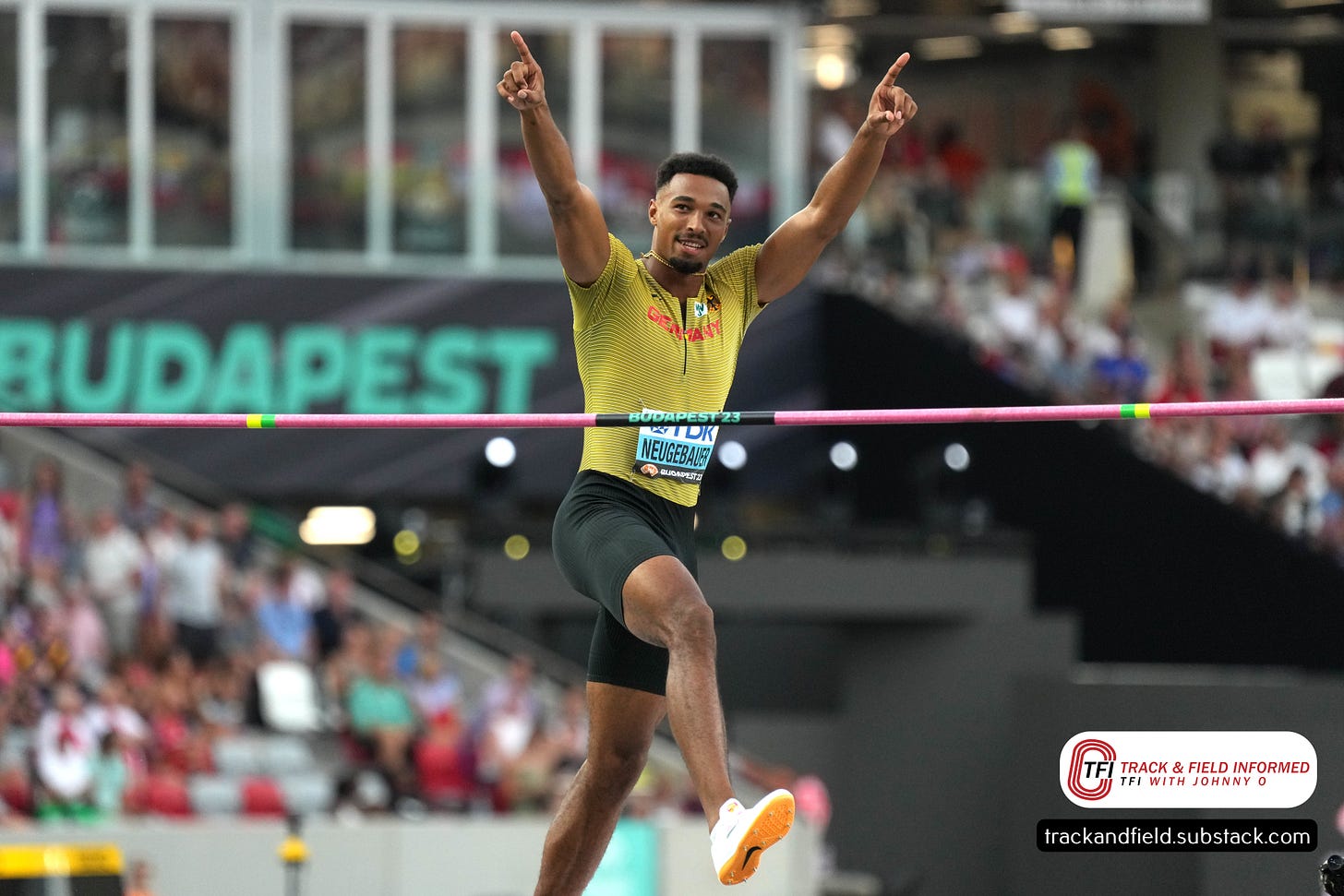
The U.S. and Italy won the two heats of the men’s 400 relay with times of 37.67 and 37.65, respectively.
The Italians, with Olympic 100-meter champion Marcell Jacobs running the second leg, looked good in winning the second heat.
However, the Americans had a shaky pass from third leg Brandon Carnes to anchor runner JT Smith, who then ran a sub-par leg in which he narrowly held off teams from Jamaica (37.68) and Japan (37.71).
Smith should be out of the U.S. line-up for the final on Saturday when the American team is expected to include Lyles.
Canada, which had upset the U.S. in the winning the World title last year, did not advance to the final after finishing sixth in 38.25 in its semifinal.
In the women’s 400 relay, Jamaica and the U.S. won their heats in 41.70 and 41.59, respectively.
The U.S. team came very close to being disqualified as third leg Tamara Clark took off too early and received the baton from TeeTee Terry inches before she was out of the passing zone.
The Jamaican team should include 200 champion Jackson when it competes in the final on Saturday.
The U.S. squad is expected to include 100 champion Richardson, and it might also include 200 silver medalist Thomas.
The top three qualifiers in the men’s javelin were Olympic champion Neeraj Chopra of India at 88.77 (291-3), Arshad Nadeem of Pakistan at 86.79 (284-9), and Olympic silver medalist Jakub Vadlejch of the Czech Republic at 83.50 (273-11).
Fifteen women advanced to the final of the women’s high jump. Eight of the 15 cleared 1.92 (6-3½) in qualifying and another seven were drawn from the 11 women who cleared 1.89 (6-2¼).
Eleanor Patterson and Nicola Olyslagers of Australia and Yaroslava Mahuchikh of Ukraine were amongst the qualifiers.
Patterson and Mahuchikh won the gold and silver medals last year. Olyslagers was the silver medalist in the Olympics.



